Relevant Overviews
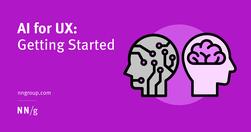
Use generative-AI tools to support and enhance your UX skills — not to replace them. Start with small UX tasks and watch out for hallucinations and bad advice. All UX professionals should use AI: it’s helpful at any level of seniority and for many tasks within the UX lifecycle (including research, design, and writing).

Free study guides by Nielsen Norman group on almost every UX topic. Each study guide is a curated collection of free articles and videos, organised by theme and suggested reading order.
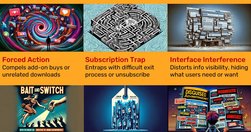
New regulations from the Government of India prohibit the use of 12 common dark design patterns. These sneaky practices are unethical applications of established UX knowledge to make interface designs that harm users instead of helping them.

Two short infographics define UX and summarize why and how to run UX projects. Show to your boss or colleagues who don’t understand UX. This ticket to UX mastery only requires 3 minutes of your time.

Use this glossary to quickly clarify key terms and concepts related to research methods in UX.

In a case study of ChatGPT evaluating 12 e-commerce screenshots, most of the AI-driven redesign suggestions were inconsistent and untrustworthy. Human UX expertise must be employed to judge UX advice from AI.

Users spend most of their time on other websites, so they expect your site to work like all the other sites they already know. When a design deviates from users’ expectations, usability suffers. Don’t be arrogant and assume that your new design idea is so brilliant that it can overrule decades of user habituation.
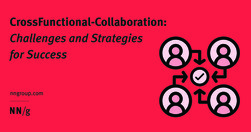
To improve crossfunctional collaboration, UX teams must be aware of the challenges they face and develop tailored solutions for each unique challenge

Your constantly-updated definition of Mobile User Experience (UX) Design and collection of topical content and literature

In a distracted environment, the best form of smartphone interaction is a high-speed, easy-to-use one. Luke calls the typical mobile usage a "one thumb, one eyeball" experience, since the highly distracted environment causes most mobile users to engage in one-handed use with short spans of partial attention.
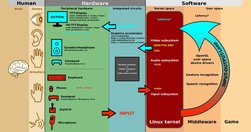
The easier your mobile application is to learn to use and the easier it is for your users to find the functionality to learn it – the more useful that application is likely to be to the user. The user experience is also likely to greater.

Hick’s Law (or the Hick-Hyman Law) states that the more choices a person is presented with, the longer the person will take to reach a decision. Named after psychologists William Edmund Hick and Ray Hyman, Hick’s Law finds frequent application in user experience (UX) design—namely, to avoid overwhelming users with too many choices, thereby keeping

A good design process: How is someone navigating through it? How are these things co-located together? Which pages are we grouping together? Can people find them? ... less attached to the tone of voice and more interested in simplicity and utility ... more like an architect than a prose-writer, putting LEGO blocks together in the most useful w…
Surveys asking users to give feedback during or after an interaction should not interrupt the users' task and should be sent to the appropriate channel. They need to be short, easy to complete, and give the user the opportunity to provide details about their experience.

Unsure where to start? Use this collection of links to our articles and videos to learn more about the basics of user experience.

Determining the nature and properties of trust at first may seem pointless [...] As it relates to UX design, it’s a scientific concept that means the difference between a user building faith in a design and staying to interact more, or that user leaving, never to return and perhaps telling others to beware of it.

The choices are so many that the decision to pick one (the optimal), becomes unmanageably hard. And even when a choice is made, second thoughts and doubts about whether it was the best, linger in the background, slowly consuming brain energy and peace of mind.
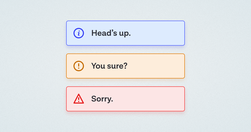
A while back, in the early days of our design system, we had a ticket for a component sitting in our backlog, with the title “Alert.” My initial reaction was “Oh yeah, a colored box with a little icon to the left of it and some text, easy.” Oh dear reader, how naive I was…
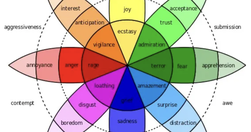
What separates great products from good ones? Attractive designs? User testing? Genius designers? Well, these might be contributory factors, but the true distinction lies in how they make users feel. Emotional design plays a huge role in the success of UX design.
Skilled UX designers and teams use tools such as empathy mapping to help them create products that keep the user or customer at the center of the design process, resulting in a product that resonates with users and provides a good user experience. But what is an empathy map, what are its uses, and how does empathy mapping fit into the process?

Our UX-maturity model has 6 stages that cover processes, design, research, leadership support, and longevity of UX. Use our quiz to get an idea of your organization’s UX maturity.
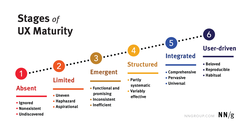
We'll ask questions about how your organization approaches UX. Based on your answers, we'll give you an estimate of your organization's UX maturity. This assessment is based on the Nielsen Norman Group UX Maturity Model. There are six stages in the UX maturity model.

The case for accessibility has to be about more than a legal and moral requirement. It has to persuade management that accessibility will generate a return on investment.
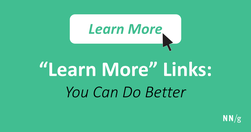
The phrase ‘Learn More’ is increasingly used as a crutch for link labels. But the text has poor information scent and is bad for accessibility. With a little effort, transform this filler copy into descriptive labels that help users confidently predict what the next page will be.

accessibility in journalism is important for everyone: Making news products more accessible, after all, often means making them more user-friendly and efficient. He hopes to discover and standardize ways of making the Post’s journalism accessible to as many people as possible.
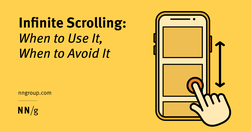
Infinite scrolling minimizes interaction costs and increases user engagement, but it isn’t a good fit for every website. For some, pagination or a Load More button will be a better solution.

The more choices a user has to make, the bigger the risk of getting into trouble. More features can easily reduce usability.

It's hard work to make a user interface that's easy to use. The end result may seem obvious to an outsider, but ease-of-use comes from trying out many design ideas and rejecting ones that are too difficult while polishing those that make the UI better.

A myriad of fields, skills and insights come together to create the overarching discipline of user experience design... Let’s explore five behavioral science insights you can use right now to design better products

UX (user experience) research is the systematic study of target users and their requirements, to add realistic contexts and insights to design processes. UX researchers adopt various methods to uncover problems and design opportunities. Doing so, they reveal valuable information which can be fed into the design process.